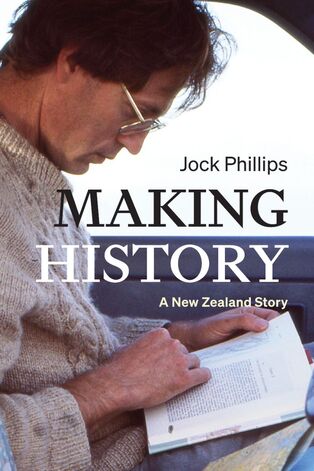
by Jock Phillips
If ever there was a person who found himself in the right place at the right time it was J.O.C. (Jock) Phillips. As he states in the introduction, he was privileged by his upbringing, with its richness of culture and emphasis on historical writing; and as part of a cohort of baby boomers who “began to articulate a new cultural nationalism.” He acknowledges his unique opportunity to present history to New Zealanders, just as the internet took off, and through getting the position of chief historian and in other roles.
The book essentially tells two stories, one being about his own family background, and the other being his life as a historian. In many ways the first few chapters, which portray both sides of his family, are the more interesting.
His father, Neville, was from Dannevirke, then went to Canterbury College, and on to Oxford University just before the war. After war service he returned to Christchurch and became a history professor, and later Vice-Chancellor, before succumbing to his Anglophile instincts and returning ‘home’ to England.
The most interesting chapter is entitled ‘My mother and the land’. Jock’s mother Pauline Palmer was from a more affluent background, involving pastoral farming in Hawkes Bay, before taking an MA at Canterbury College. But by delving back into her family history, in Australia and in Canterbury, Jock provides some interesting insights into colonial history and the use of land.
The young John Phillips got the best of education in New Zealand, Christ’s College at the age of 12, and also wonderful holidays on his uncles’ farms in Hawkes Bay. It was this that gave him an appreciation of the land in economic and aesthetic terms. At age 15 Phillips joins his parents in England while his father is on a sabbatical, and gets to attend Dulwich College in London, and a path opens up for him to eventually attend Cambridge University. Instead, he returns to New Zealand, and ventures up to Wellington to begin an undergraduate degree at Victoria. With a scholarship he travels to Cambridge, Massachusetts, in the late 1960s, to attend Harvard. There is an interesting account of what a rigorous PhD programme actually entails. Jock also gets to enjoy the popular culture, dips his toes into American politics, and marries Phillida Bunkle. They return to New Zealand to share a History lectureship at Victoria, in 1973. Jock makes progress up the academic ladder but eventually gets frustrated.
At first seconded to the public service, Jock then begins to innovate with a new form of ‘public history’, and an intention to make history accessible to a wider audience. This included commissioning written histories of government departments; being involved in the set-up of Te Papa’s exhibitions; and then creating the on-line encyclopaedic resource Te Ara.
The details of this glorious career reflect a certain form of luck: just when the public service was being restructured or dismantled, Phillips was able to develop roles that defied the trend.
One of the main reasons is his ability to network, and highlights the role of personal contacts. Jock set up the NZ History Research Trust Fund with the help of the minister, Michael Bassett, who was otherwise ideologically opposed to the State. The trust fund started off making modest grants to mostly amateur historians. In recent years, however, the grants have got bigger, but the recipients have often been insiders linked to Phillips, such as older sister Elizabeth. Similarly, the later official histories of government departments were written by non-experts who barely touch the available archive records; and some of the contributors to Te Ara are retired academics who did not research policymaking during their careers. So while the collegial nature of Phillips’ practice is always presented in glowing terms, it is actually a rather small elite based in Wellington.
Author: Jock Phillips
Publisher: Auckland University Press
ISBN: 9781869408992
RRP:$45
Available: bookshops

 RSS Feed
RSS Feed
